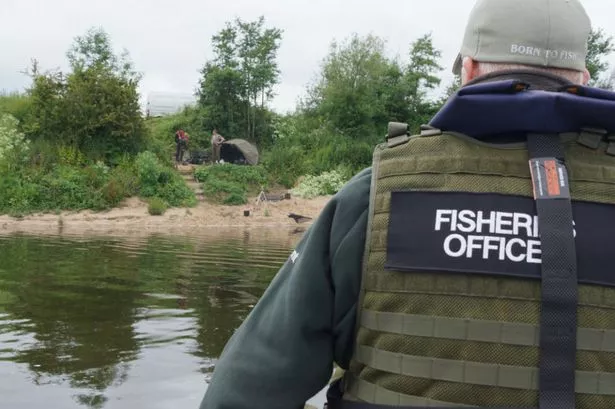Introduction: The Case at a Glance
Environment Agency Piotr Wieclaw Fishing Fine: In July 2025, the Environment Agency in England announced that Piotr Wieclaw, age 52, had been fined £800 after being convicted for fishing without a licence and removing a protected eel from a river instead of returning it. This case brings into sharp relief the legal protections afforded to endangered aquatic species, the enforcement powers of the Environment Agency, and the consequences of noncompliance. In this article, we’ll deep-dive into what happened, the relevant laws, the role of enforcement, the environmental rationale, and lessons for anglers and environmental oversight.
Background: Who Is Piotr Wieclaw and What Occurred
On the weekend of 3 August 2024, Wieclaw journeyed from his home in Merton, South West London, to a stretch of the River Medway between Tonbridge and Maidstone, at a location called Porters Lock. While fishing with three other individuals, a small fire was observed near their fishing site by a member of public who then alerted the Environment Agency. Upon arrival, enforcement officers found a dead eel under a towel adjacent to the fire, and Wieclaw was unable to present a valid rod fishing licence.
During court proceedings at Wimbledon Magistrates’ Court, Wieclaw pleaded guilty to two principal charges:
- Fishing without a valid rod licence, contrary to section 27(1)(a) of the Salmon and Freshwater Fisheries Act 1975.
- Removing a protected eel from the river (i.e. not returning it immediately), breaching National Byelaw 3 under Schedule 25 and sections 210 and 211 of the Water Resources Act 1991.
The court imposed a fine of £800, plus £135 in costs and a £320 victim surcharge.
Interestingly, some sources also mention a split fine breakdown: £335 for unlicensed fishing and £735 for removal of eel or shad by rod and line. But the government press release consolidates the total fine as £800 (inclusive).
This event triggered renewed public and media attention on the protection of critically endangered eels and how strictly the Environment Agency enforces fishing regulations.
Legal Framework: Laws & Regulations Invoked
To understand why Wieclaw’s actions were illegal and how the fine was justified, one must examine the relevant statutory laws and byelaws:
1. Salmon and Freshwater Fisheries Act 1975
- Section 27(1)(a) mandates that anyone aged 13 or over must hold a rod fishing licence to fish for salmon, trout, eels or freshwater fish.
- Failure to present a valid licence when challenged constitutes an offence.
2. Water Resources Act 1991 & National Byelaw 3 (Schedule 25)
- Under sections 210 and 211 of the Water Resources Act, the regulation of byelaws covering fisheries is permitted.
- National Byelaw 3 (Schedule 25) specifically addresses the handling of eel catches: any eels caught must be returned to the water with minimal harm and without removal.
- Removing an eel from the water, failing to return it immediately, or killing it constitutes a breach.
The combination of these statutes gives the Environment Agency the legal basis to enforce licensing requirements and protect endangered species.
Role and Powers of the Environment Agency in Fisheries Enforcement
The Environment Agency (EA) is the key regulatory and enforcement body in England tasked with protecting water quality, biodiversity, and sustainable use of natural resources.
Fisheries Enforcement Division
- The EA operates a Fisheries Enforcement arm, responsible for patrolling rivers, canals, lakes and private water bodies to detect illegal fishing, pollution, and habitat damage.
- They have warranted officers who can enter premises, inspect equipment, seize illicit catches, and initiate prosecutions.
Incident Hotline & Public Reporting
- The EA encourages public vigilance: anyone who suspects environmental crimes (illegal fishing, pollution, habitat damage) can call the EA’s incident hotline (e.g., 0800 807060)
- In this case, a member of public spotted a fire and reported suspicious fishing activity, triggering the EA’s response.
Investigations & Prosecutions
-
Upon arrival, officers can gather evidence: photos, interviews, catch inspection, licence checks, and forensic details of fish condition.
-
They liaise with courts and the Crown Prosecution Service (CPS) to bring offences to trial.
-
Fines, costs, and victim surcharges may be levied to penalize offenders and deter recurrence.
Public Communication & Deterrence
- The EA issues news releases about prosecutions to inform the public and deter illegal behaviour.
- It also works in partnership with angling organizations, the Angling Trust, local police, and community groups.
Thus, the EA operates not just as a regulator but also as an active enforcer and educator in protecting fisheries and aquatic biodiversity.
Environmental Importance: Why Eels and Rivers Matter
The Conservation Status of Eels
- The European eel (Anguilla anguilla) is considered critically endangered.
- Over past decades, eel populations have declined sharply, due to over-fishing, habitat loss, barriers to migration (dams, weirs), parasites, and climate change
- Because they have a complex life cycle (marine larval phase, freshwater growth, returning to sea to spawn), their survival depends on healthy riverine and coastal connectivity.
Eels’ Ecological Role
- Eels feed on invertebrates, small fish, molluscs, and help recycle nutrients in aquatic food webs.
- They serve as prey for higher predators (birds, fish, mammals).
- Their decline can create cascading ecological effects in rivers, reducing ecosystem resilience and altering community structure.
Rivers as Biodiversity Corridors
- Rivers like the Medway are ecological corridors that connect terrestrial and marine ecosystems.
- They host diverse species of fish, invertebrates, plants, birds, amphibians.
- Maintaining water quality, flow regimes, and habitat structure is critical for the health of freshwater ecosystems.
In short, enforcement of eel protections is not symbolic — it is essential to preserve ecological balance, safeguard endangered species, and ensure rivers remain functioning and biodiverse systems.
Lessons, Implications, and Key Takeaways
For Anglers & Recreational Fishers
- Always obtain and carry a valid rod licence when fishing for salmon, trout, eels or freshwater species.
- Understand protected species rules: if you catch a protected eel, you must return it immediately and with minimal harm — do not remove or kill it.
- Be aware of byelaws and local regulations — they vary by region and waterway.
- Respect public reporting systems — vigilant citizens can trigger enforcement.
For Environmental Agencies & Regulators
- Public outreach is vital — clear communication increases compliance and awareness.
- Partnerships with local angling associations, community groups, and police strengthen enforcement networks.
- Transparency in prosecutions (press releases, court outcomes) enhances deterrence effect.
- Continued surveillance, data collection, and proactive strategy are required to protect declining species.
For the Public & Civil Society
- Citizen observation plays a key role — reporting suspicious activity helps enforcement.
- Understanding that fines and prosecutions are not punitive for their own sake, but deter behaviour detrimental to shared natural heritage.
- Support for initiatives that restore river habitats, remove barriers, and rehabilitate aquatic ecosystems is essential.
This case underscores that wildlife laws matter, even for small-scale actions. When a private angler missteps, strict enforcement can and should follow.
Conclusion
The case of Environment Agency vs Piotr Wieclaw serves as a sharp reminder that fishing is a regulated privilege, not a free license. When your catch is a critically endangered eel, removal or harm is not just frowned upon — it is illegal. The combined legislative powers of the Salmon and Freshwater Fisheries Act 1975, Water Resources Act 1991, and National Byelaw 3 gave enforcement officers ample grounds to prosecute. The £800 fine (plus costs and surcharge) reflects the seriousness of failing to both hold a valid licence and to return a protected species to the water.
Beyond the headline, the case highlights larger themes: the fragility of eel populations, the responsibility of anglers, and the crucial role of enforcement agencies in preserving aquatic ecosystems. Ultimately, it is a vivid example of how a single moment of noncompliance can spark legal, environmental, and reputational consequences.
FAQs
1. Why was the fine £800 — not higher or lower?
The magistrates considered factors like the severity of offence (protected species removal), absence of licence, and legal precedent. They added costs (£135) and a victim surcharge (£320), reaching the total penalty.
2. Could Wieclaw have avoided the fine?
Yes — by holding a valid rod licence and immediately returning the eel to the water without harm. Compliance would have rendered the act legal under applicable laws.
3. Are eels always protected in UK rivers?
Not all eels everywhere are strictly protected, but byelaws and national regulations restrict their removal. Many rivers require any caught eel to be returned because eel stocks are designated as critically endangered.
4. How can the public report illegal fishing or environmental crime?
In England, they can call the Environment Agency incident hotline (e.g. 0800 807060) or use online forms. Vigilant public reporting was what triggered enforcement in this case.
5. Do all catches require a licence?
In England, a rod fishing licence is required for species like salmon, trout, eels, and freshwater fish if aged 13 or over. Some coarse fishing may also require a licence depending on species and waterbody.








